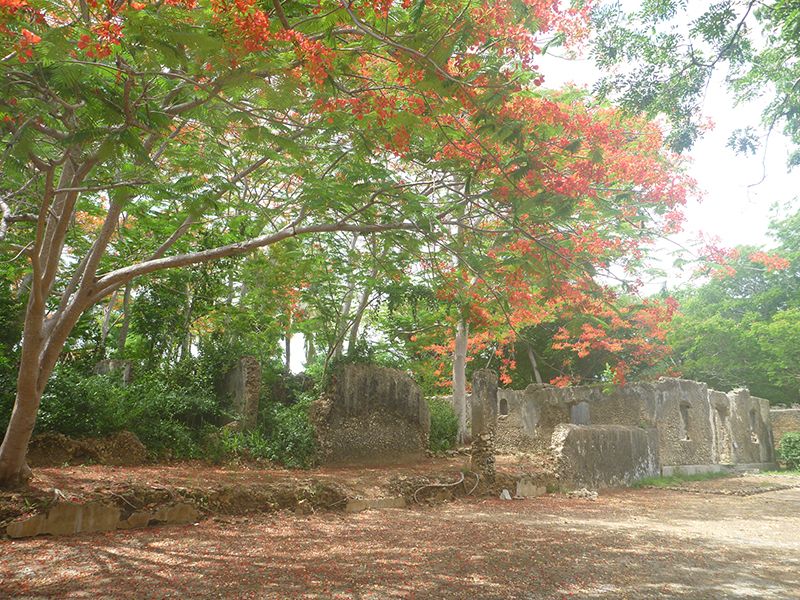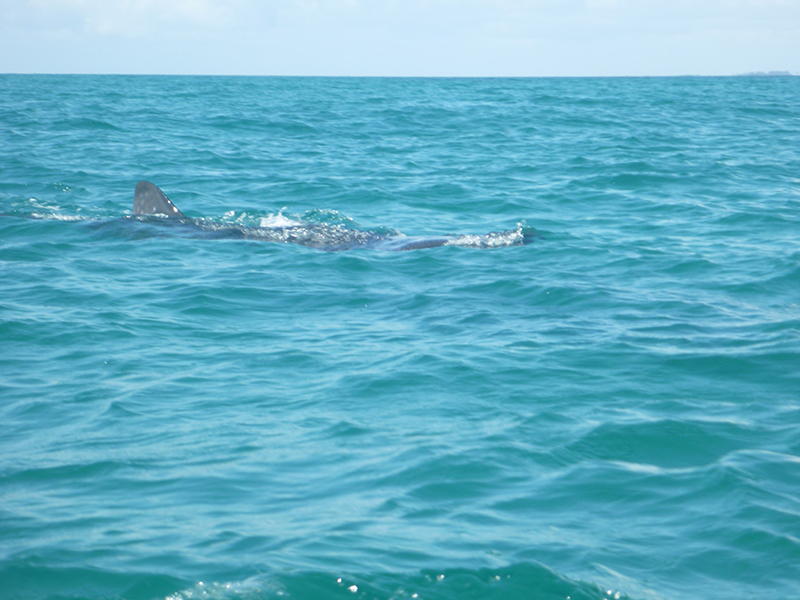How to Move to Africa & Work in International Aid, with Jessica Padron
This is part of my unconventional interview series, designed to demonstrate the wildly varied ways we can live, work, and chase our dreams. Please keep in mind that, since these are interviews, the opinions, methods, and websites contained within do not necessarily reflect my own views or experiences. (Which is, in my opinion, part of what makes them wonderful.)
Today, I’m thrilling to introduce my friend Jessica Padron, who recently moved to Tanzania for a job in international development and is here to tell us all about it.
First, tell us about you. How long have you been in Africa and where do you live? What do you do for a living? What do you do for fun?
I’m an international development communications professional, meaning I do public relations for kind of unsexy but important issues like agriculture, health, and governance in developing countries where my organization works. My job involves everything from press relations and speechwriting to managing web content and graphic design projects, all with the intent of promoting our work and advancing strategic development goals like encouraging governments to empower women and mobilize more of their own resources so they ultimately won’t have to rely on donor assistance. I moved to Dar es Salaam, Tanzania, with my husband about a year ago to take this job (I had previously worked in my organization’s headquarters in Washington, DC).
Outside of work, I’m a food and travel enthusiast, a politics and big ideas junkie with a few too many strong opinions, and a musical geek with enough classical training to maintain some semi-serious hobbies. Since I moved to Dar, I’ve co-founded an a cappella group, been part of the first Swahili-language choral performance of Beethoven’s 9th symphony, and played keyboard in the live band for a local production of the Rocky Horror Show.

When did you first start traveling and what made you fall in love with it?
I’ve been road tripping with my family around the United States since I was 10 days old, but the trip that really gave me the travel bug was when I participated in an exchange program with a French school near Paris in the 9th grade.
I stayed with a French family for a few weeks and did some traveling around the country with classmates. Beyond the wonderful cultural and language immersion and fabulous food, that trip underscored for me a lot of the things I think many people take away from traveling: that human connection is universal, that experiencing life beyond your own borders (be they geographical, philosophical, or otherwise) is priceless, and that patience, kindness, and flexibility will take you very far.
I also love that travel has built my confidence and taught me to trust myself. Many people seem to think that traveling to faraway parts of the world takes a lot of bravery, and sometimes it does, but I think the more you do it, the more you realize you’re capable of and the less daunting it feels.
How did you decide to move to Africa?
I’ve known since college I wanted to pursue a career in international relations and had been looking for the right opportunity to live and work overseas. I had already traveled for weeks or months at a time to do internships or other short-term assignments as part of my job, but I knew that if I wanted to advance in this field I needed to find a longer-term position abroad and build some experience closer to international development programs.
When this job opportunity arose in Tanzania, I had just gotten married and my husband and I were ready to take the leap into a future we had talked about for years. East Africa also held a lot of appeal for me: it’s a beautiful part of the world with incredible wildlife and geographic diversity. Plus, Tanzania is English-speaking and relatively democratic and peaceful, so the transition was not as difficult as it might have been to some other African countries.

What have been some of the greatest joys of your time there so far?
This isn’t always the case for couples, but moving to a faraway country has been great for my marriage. I’m building priceless experience in my field and fulfilling a long-term dream of living overseas, while my husband (who had never left the U.S. before we started dating and has since become one of the best and most adaptable travelers I’ve ever met) got to quit a job that had run its course and launch a series of new projects in digital design that he’s much more excited about.
I’m the breadwinner at the moment, but I think this move will prove valuable for both our careers in the long run and, in the meantime, we’re constantly problem-solving and having new experiences together, which has deepened our partnership in many ways. We both feel lucky we ended up with someone who’s making our dreams possible!
Another thing I loved about moving here is that I felt instantly part of a community of like-minded people, which sounds counterintuitive given that I’d moved an ocean and continent away from my hometown, family, and closest friends. But we’ve bonded quickly with other expats, because it takes a certain set of qualities to be open to the idea of moving your whole life from the U.S. to sub-Saharan Africa, and I love that it’s so easy to make friends here who are resilient, adventurous, savvy, compassionate, global thinkers.

What have been the biggest challenges?
The flip side of joining a close-knit community of expats while living in a country that is much poorer than most Western ones is that it isn’t as easy as I would like to make friends with local Tanzanians. I have good relationships with my Tanzanian colleagues and really enjoy singing in a choir that is mostly made up of Tanzanian singers, but there is definitely a class barrier that is hard to overcome from a social standpoint. A lot of the things Westerners tend to do for fun here – eat out at nice restaurants, go boating, etc. – are not financially accessible activities for many Tanzanians, and the clubs and festivals where I’ve most often seen Tanzanians in my age range gather to socialize are not ideal venues for meeting new friends, at least for me (I’m learning that sound stages blasting unbelievably loud hip hop music are a staple of many large-scale, recreational public events in this region).
That divide is exacerbated by the infrastructure issues that so often come with living in a developing country. For example, living in a safe neighborhood with modern amenities and reliable power in Dar es Salaam means paying a premium and residing mostly among other wealthy expats. The middle and even upper class Tanzanians I know mostly live in parts of the city that, in Dar traffic, could take upwards of two hours to get to on any given day. And, frankly, any light-skinned person in almost any African country may find it hard not to feel like a spectacle sometimes; in Tanzania, it isn’t uncommon for people to stare and yell “mzungu” (Swahili for rich, white person) at you apropos of nothing. Even though it’s typically not hostile, that attention based on perceived wealth and status can foster a self-conscious feeling of being an unavoidable curiosity to locals and, in a much smaller number of cases, even a target for theft or other crime. So there are some logistical difficulties in trying to integrate that I’m still figuring out how to manage.

What was the craziest experience?
Swimming in the open ocean with sharks over Christmas vacation! Which isn’t as crazy as it sounds, because they were whale sharks and whale sharks only eat plankton and couldn’t eat a human even if they wanted to. But it was still thrilling and easily in the top three coolest experiences of my life. If you are ever in Tanzania between September and February, a trip to Mafia Island to check out the whale sharks with a responsible operator is definitely a worthwhile investment of your time and travel dollars. (The responsible part is key because the majority of tour operators have a tendency to crowd around the sharks, dump boatloads of people on top of them, and otherwise create a very distressing experience for the animals.)
How did you get the job that allows you to live in Africa? What tips might you give for someone interested in a similar career path?
The organization I’ve worked for since 2011 operates in about 100 countries, so there are regular job openings in Africa and many other parts of the world; I basically just waited for one to open up that was the right fit for me at the right time, and I jumped on it. But the way I broke into that organization in the first place was by leveraging a valuable contact in my network who helped me navigate a very opaque hiring process; I never would have gotten or even known about that job otherwise, and it was sheer luck that it opened up right as I was finishing grad school. So there was a lot of serendipity involved, but I think it demonstrates how important it can be in many fields to build and work your network so those opportunities have a better chance of coming your way.
If you’re interested in careers in development, the first thing you need to do is get educated about international politics and where the funding streams are for development assistance, because the jobs follow the money. If you have some technical skills you never thought of applying to development, that’s good news because a lot of jobs in this field are held by statisticians, crop scientists, epidemiologists, engineers, and others who have “hard” skills that are quite useful in countries where data, crops, health, infrastructure, etc. are quite poor.
“Soft” skill-based communications jobs like mine are frankly in lower demand, but if you are an organized person who can keep tabs on a budget then there are also a decent number of project management jobs for generalists. I firmly believe the best way to find any of those jobs is to talk to people working in this area to orient yourself to a complex industry, but having overseas experience with Peace Corps, teaching English, various government fellowships like Boren or Fulbright, etc. can also help open doors.


How did you prepare for your time abroad? Any tips for people thinking about living abroad and particularly in Africa?
My husband and I had about two months to downsize our DC apartment into six suitcases and move our lives to Tanzania, so my preparation strategy largely revolved around efficient organization and ruthless prioritization! (Not to mention forcing myself to be thoroughly emotionally detached from most of our possessions.) But as far as logistics, I just made a point to talk to people who live or had lived in Dar and could point me in the right direction for things like health insurance and transportation. This goes back to what I said earlier about trusting myself: moving to Dar was a big deal and there were a lot of unknowns, but it was my third time moving to a new city, my second time negotiating those challenges outside the United States, and my umpteenth time taking a leap of faith and traveling to an unfamiliar country. I knew I could do it, and I knew I had the skill set to deal with any problems once we got here. That was an awesome feeling of empowerment even though the transition was overwhelming at times.
There are over a billion people in over 50 countries in Africa, so your experience living abroad on this continent will obviously vary tremendously depending on where you’re headed. But my advice to anyone thinking about living abroad, particularly in a country like Tanzania that has only been independent for about 50 years and faces huge structural barriers to sustainable, equitable prosperity and well-being for its people, is to be willing to take things in stride and have some perspective about the challenges you are likely to face. Even for the most even-keeled person, it can wear on you when your power and water go out multiple times in a week, or the roads are flooded because of non-existent urban planning, or you get malaria, or people drive like maniacs because there is no reliable system of earning licenses and enforcing traffic laws. But if you’re an expat from a comparatively wealthy country, the impact you feel from those things is probably very low compared to the impact on locals, and even though we have blueprints now for things like mass transport and waste management, those things don’t just spring out of the earth once a former colony starts managing its own affairs.
As you would be anywhere abroad (and hopefully at home), be kind, be patient, be flexible. Try to be part of the solution and don’t be indignant that not every country is managing complex social challenges to the same standard your country of origin might be. Of course, don’t be naive if you see obvious instances of mismanagement or corruption, but also don’t be unwilling to give people the benefit of the doubt.

What’s next for you?
In the immediate future, I’m taking my first trip to South Africa for vacation and training this summer, then coming back to Tanzania to go on safari and visit Zanzibar with my family, who are rising to the occasion of an African adventure!
As for the longer term…I’m not sure yet! I’m taking the Foreign Service exam in the fall, so if I pass that will potentially open up some new options in late 2016/early 2017. But for now I’m planning to be in Tanzania for at least another year. After that, I may extend my contract or I may take a similar job with my organization in another country. Or I may look for opportunities with a totally different organization, either abroad or back in DC, a city I love dearly in spite of all the haters.
I haven’t even ruled out some wackier options like going back to school for a socially-oriented business degree or moving to Denver (another city I love) just because or taking a page out of Gigi’s book and co-launching a nomadic digital business with my husband. Getting a job overseas has been a dream of mine for so long that, once I achieved it, it opened up a whole new flow chart of possible trajectories. A lot will depend on timing and how things shake out during what is turning out to be a tumultuous political and economic year in many parts of the world, so I’m leaving my options open for now.
HUGE thanks to Jess for answering my questions. Any questions of your own for her? Toss them in the comments.

Leave a Reply